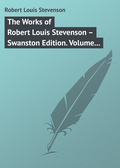
Роберт Льюис Стивенсон
Vailima Letters
Wednesday. (Hist. Vailima resumed.)
A gorgeous evening of after-glow in the great tree-tops and behind the mountain, and full moon over the lowlands and the sea, inaugurated a night of horrid cold. To you effete denizens of the so-called temperate zone, it had seemed nothing; neither of us could sleep; we were up seeking extra coverings, I know not at what hour – it was as bright as day. The moon right over Vaea – near due west, the birds strangely silent, and the wood of the house tingling with cold; I believe it must have been 60°! Consequence; Fanny has a headache and is wretched, and I could do no work. (I am trying all round for a place to hold my pen; you will hear why later on; this to explain penmanship.) I wrote two pages, very bad, no movement, no life or interest; then I wrote a business letter; then took to tootling on the flageolet, till glory should call me farmering.
I took up at the fit time Lafaele and Mauga – Mauga, accent on the first, is a mountain, I don’t know what Maugà means – mind what I told you of the value of g – to the garden, and set them digging, then turned my attention to the path. I could not go into my bush path for two reasons: 1st, sore hands; 2nd, had on my trousers and good shoes. Lucky it was. Right in the wild lime hedge which cuts athwart us just homeward of the garden, I found a great bed of kuikui – sensitive plant – our deadliest enemy. A fool brought it to this island in a pot, and used to lecture and sentimentalise over the tender thing. The tender thing has now taken charge of this island, and men fight it, with torn hands, for bread and life. A singular, insidious thing, shrinking and biting like a weasel; clutching by its roots as a limpet clutches to a rock. As I fought him, I bettered some verses in my poem, the Woodman; the only thought I gave to letters. Though the kuikui was thick, there was but a small patch of it, and when I was done I attacked the wild lime, and had a hand-to-hand skirmish with its spines and elastic suckers. All this time, close by, in the cleared space of the garden, Lafaele and Maugà were digging. Suddenly quoth Lafaele, ‘Somebody he sing out.’ – ‘Somebody he sing out? All right. I go.’ And I went and found they had been whistling and ‘singing out’ for long, but the fold of the hill and the uncleared bush shuts in the garden so that no one heard, and I was late for dinner, and Fanny’s headache was cross; and when the meal was over, we had to cut up a pineapple which was going bad, to make jelly of; and the next time you have a handful of broken blood-blisters, apply pine-apple juice, and you will give me news of it, and I request a specimen of your hand of write five minutes after – the historic moment when I tackled this history. My day so far.
Fanny was to have rested. Blessed Paul began making a duck-house; she let him be; the duck-house fell down, and she had to set her hand to it. He was then to make a drinking-place for the pigs; she let him be again – he made a stair by which the pigs will probably escape this evening, and she was near weeping. Impossible to blame the indefatigable fellow; energy is too rare and goodwill too noble a thing to discourage; but it’s trying when she wants a rest. Then she had to cook the dinner; then, of course – like a fool and a woman – must wait dinner for me, and make a flurry of herself. Her day so far. Cetera adhuc desunt.
Friday – I think.
I have been too tired to add to this chronicle, which will at any rate give you some guess of our employment. All goes well; the kuikui – (think of this mispronunciation having actually infected me to the extent of misspelling! tuitui is the word by rights) – the tuitui is all out of the paddock – a fenced park between the house and boundary; Peni’s men start to-day on the road; the garden is part burned, part dug; and Henry, at the head of a troop of underpaid assistants, is hard at work clearing. The part clearing you will see from the map; from the house run down to the stream side, up the stream nearly as high as the garden; then back to the star which I have just added to the map.
My long, silent contests in the forest have had a strange effect on me. The unconcealed vitality of these vegetables, their exuberant number and strength, the attempts – I can use no other word – of lianas to enwrap and capture the intruder, the awful silence, the knowledge that all my efforts are only like the performance of an actor, the thing of a moment, and the wood will silently and swiftly heal them up with fresh effervescence; the cunning sense of the tuitui, suffering itself to be touched with wind-swayed grasses and not minding – but let the grass be moved by a man, and it shuts up; the whole silent battle, murder, and slow death of the contending forest; weigh upon the imagination. My poem the Woodman stands; but I have taken refuge in a new story, which just shot through me like a bullet in one of my moments of awe, alone in that tragic jungle: —

It is very strange, very extravagant, I daresay; but it’s varied, and picturesque, and has a pretty love affair, and ends well. Ulufanua is a lovely Samoan word, ulu=grove; fanua=land; grove-land – ‘the tops of the high trees.’ Savao, ‘sacred to the wood,’ and Faavao, ‘wood-ways,’ are the names of two of the characters, Ulufanua the name of the supposed island.
I am very tired, and rest off to-day from all but letters. Fanny is quite done up; she could not sleep last night, something it seemed like asthma – I trust not. I suppose Lloyd will be about, so you can give him the benefit of this long scrawl. Never say that I can’t write a letter, say that I don’t. – Yours ever, my dearest fellow,
R. L. S.Later on Friday.
The guid wife had bread to bake, and she baked it in a pan, O! But between whiles she was down with me weeding sensitive in the paddock. The men have but now passed over it; I was round in that very place to see the weeding was done thoroughly, and already the reptile springs behind our heels. Tuitui is a truly strange beast, and gives food for thought. I am nearly sure – I cannot yet be quite, I mean to experiment, when I am less on the hot chase of the beast – that, even at the instant he shrivels up his leaves, he strikes his prickles downward so as to catch the uprooting finger; instinctive, say the gabies; but so is man’s impulse to strike out. One thing that takes and holds me is to see the strange variation in the propagation of alarm among these rooted beasts; at times it spreads to a radius (I speak by the guess of the eye) of five or six inches; at times only one individual plant appears frightened at a time. We tried how long it took one to recover; ’tis a sanguine creature; it is all abroad again before (I guess again) two minutes. It is odd how difficult in this world it is to be armed. The double armour of this plant betrays it. In a thick tuft, where the leaves disappear, I thrust in my hand, and the bite of the thorns betrays the topmost stem. In the open again, and when I hesitate if it be clover, a touch on the leaves, and its fine sense and retractile action betrays its identity at once. Yet it has one gift incomparable. Rome had virtue and knowledge; Rome perished. The sensitive plant has indigestible seeds – so they say – and it will flourish for ever. I give my advice thus to a young plant – have a strong root, a weak stem, and an indigestible seed; so you will outlast the eternal city, and your progeny will clothe mountains, and the irascible planter will blaspheme in vain. The weak point of tuitui is that its stem is strong.
Supplementary Page
Here beginneth the third lesson, which is not from the planter but from a less estimable character, the writer of books.
I want you to understand about this South Sea Book. The job is immense; I stagger under material. I have seen the first big tache. It was necessary to see the smaller ones; the letters were at my hand for the purpose, but I was not going to lose this experience; and, instead of writing mere letters, have poured out a lot of stuff for the book. How this works and fits, time is to show. But I believe, in time, I shall get the whole thing in form. Now, up to date, that is all my design, and I beg to warn you till we have the whole (or much) of the stuff together, you can hardly judge – and I can hardly judge. Such a mass of stuff is to be handled, if possible without repetition – so much foreign matter to be introduced – if possible with perspicuity – and, as much as can be, a spirit of narrative to be preserved. You will find that come stronger as I proceed, and get the explanations worked through. Problems of style are (as yet) dirt under my feet; my problem is architectural, creative – to get this stuff jointed and moving. If I can do that, I will trouble you for style; anybody might write it, and it would be splendid; well-engineered, the masses right, the blooming thing travelling – twig?
This I wanted you to understand, for lots of the stuff sent home is, I imagine, rot – and slovenly rot – and some of it pompous rot; and I want you to understand it’s a lay-in.
Soon, if the tide of poeshie continues, I’ll send you a whole lot to damn. You never said thank-you for the handsome tribute addressed to you from Apemama; such is the gratitude of the world to the God-sent poick. Well, well: – ‘Vex not thou the poick’s mind, With thy coriaceous ingratitude, The P. will be to your faults more than a little blind, And yours is a far from handsome attitude.’ Having thus dropped into poetry in a spirit of friendship, I have the honour to subscribe myself, Sir,
Your obedient humble servant,
Silas Wegg.
I suppose by this you will have seen the lad – and his feet will have been in the Monument – and his eyes beheld the face of George. Well!
There is much eloquence in a well!
I am, Sir
Yours
CHAPTER II
Vailima, Tuesday, November 25th, 1890.
My dear Colvin, – I wanted to go out bright and early to go on with my survey. You never heard of that. The world has turned, and much water run under bridges, since I stopped my diary. I have written six more chapters of the book, all good I potently believe, and given up, as a deception of the devil’s, the High Woods. I have been once down to Apia, to a huge native feast at Seumanutafa’s, the chief of Apia. There was a vast mass of food, crowds of people, the police charging among them with whips, the whole in high good humour on both sides; infinite noise; and a historic event – Mr. Clarke, the missionary, and his wife, assisted at a native dance. On my return from this function, I found work had stopped; no more South Seas in my belly. Well, Henry had cleared a great deal of our bush on a contract, and it ought to be measured. I set myself to the task with a tape-line; it seemed a dreary business; then I borrowed a prismatic compass, and tackled the task afresh. I have no books; I had not touched an instrument nor given a thought to the business since the year of grace 1871; you can imagine with what interest I sat down yesterday afternoon to reduce my observations; five triangles I had taken; all five came right, to my ineffable joy. Our dinner – the lowest we have ever been – consisted of one avocado pear between Fanny and me, a ship’s biscuit for the guidman, white bread for the Missis, and red wine for the twa. No salt horse, even, in all Vailima! After dinner Henry came, and I began to teach him decimals; you wouldn’t think I knew them myself after so long desuetude!
I could not but wonder how Henry stands his evenings here; the Polynesian loves gaiety – I feed him with decimals, the mariner’s compass, derivations, grammar, and the like; delecting myself, after the manner of my race, moult tristement. I suck my paws; I live for my dexterities and by my accomplishments; even my clumsinesses are my joy – my woodcuts, my stumbling on the pipe, this surveying even – and even weeding sensitive; anything to do with the mind, with the eye, with the hand – with a part of me; diversion flows in these ways for the dreary man. But gaiety is what these children want; to sit in a crowd, tell stories and pass jests, to hear one another laugh and scamper with the girls. It’s good fun, too, I believe, but not for R. L. S., ætat. 40. Which I am now past forty, Custodian, and not one penny the worse that I can see; as amusable as ever; to be on board ship is reward enough for me; give me the wages of going on – in a schooner! Only, if ever I were gay, which I misremember, I am gay no more. And here is poor Henry passing his evenings on my intellectual husks, which the professors masticated; keeping the accounts of the estate – all wrong I have no doubt – I keep no check, beyond a very rough one; marching in with a cloudy brow, and the day-book under his arm; tackling decimals, coming with cases of conscience – how would an English chief behave in such a case? etc.; and, I am bound to say, on any glimmer of a jest, lapsing into native hilarity as a tree straightens itself after the wind is by. The other night I remembered my old friend – I believe yours also – Scholastikos, and administered the crow and the anchor – they were quite fresh to Samoan ears (this implies a very early severance) – and I thought the anchor would have made away with my Simelè altogether.
Fanny’s time, in this interval, has been largely occupied in contending publicly with wild swine. We have a black sow; we call her Jack Sheppard; impossible to confine her – impossible also for her to be confined! To my sure knowledge she has been in an interesting condition for longer than any other sow in story; else she had long died the death; as soon as she is brought to bed, she shall count her days. I suppose that sow has cost us in days’ labour from thirty to fifty dollars; as many as eight boys (at a dollar a day) have been twelve hours in chase of her. Now it is supposed that Fanny has outwitted her; she grins behind broad planks in what was once the cook-house. She is a wild pig; far handsomer than any tame; and when she found the cook-house was too much for her methods of evasion, she lay down on the floor and refused food and drink for a whole Sunday. On Monday morning she relapsed, and now eats and drinks like a little man. I am reminded of an incident. Two Sundays ago, the sad word was brought that the sow was out again; this time she had carried another in her flight. Moors and I and Fanny were strolling up to the garden, and there by the waterside we saw the black sow, looking guilty. It seemed to me beyond words; but Fanny’s cri du cœur was delicious: ‘G-r-r!’ she cried; ‘nobody loves you!’
I would I could tell you the moving story of our cart and cart-horses; the latter are dapple-grey, about sixteen hands, and of enormous substance; the former was a kind of red and green shandry-dan with a driving bench; plainly unfit to carry lumber or to face our road. (Remember that the last third of my road, about a mile, is all made out of a bridle-track by my boys – and my dollars.) It was supposed a white man had been found – an ex-German artilleryman – to drive this last; he proved incapable and drunken; the gallant Henry, who had never driven before, and knew nothing about horses – except the rats and weeds that flourish on the islands – volunteered; Moors accepted, proposing to follow and supervise: despatched his work and started after. No cart! he hurried on up the road – no cart. Transfer the scene to Vailima, where on a sudden to Fanny and me, the cart appears, apparently at a hard gallop, some two hours before it was expected; Henry radiantly ruling chaos from the bench. It stopped: it was long before we had time to remark that the axle was twisted like the letter L. Our first care was the horses. There they stood, black with sweat, the sweat raining from them – literally raining – their heads down, their feet apart – and blood running thick from the nostrils of the mare. We got out Fanny’s under-clothes – couldn’t find anything else but our blankets – to rub them down, and in about half an hour we had the blessed satisfaction to see one after the other take a bite or two of grass. But it was a toucher; a little more and these steeds would have been foundered.
Monday, 31st? November.
Near a week elapsed, and no journal. On Monday afternoon, Moors rode up and I rode down with him, dined, and went over in the evening to the American Consulate; present, Consul-General Sewall, Lieut. Parker and Mrs. Parker, Lafarge the American decorator, Adams an American historian; we talked late, and it was arranged I was to write up for Fanny, and we should both dine on the morrow.
On the Friday, I was all forenoon in the Mission House, lunched at the German Consulate, went on board the Sperber (German war ship) in the afternoon, called on my lawyer on my way out to American Consulate, and talked till dinner time with Adams, whom I am supplying with introductions and information for Tahiti and the Marquesas. Fanny arrived a wreck, and had to lie down. The moon rose, one day past full, and we dined in the verandah, a good dinner on the whole; talk with Lafarge about art and the lovely dreams of art students. Remark by Adams, which took me briskly home to the Monument – ‘I only liked one young woman – and that was Mrs. Procter.’ Henry James would like that. Back by moonlight in the consulate boat – Fanny being too tired to walk – to Moors’s. Saturday, I left Fanny to rest, and was off early to the Mission, where the politics are thrilling just now. The native pastors (to every one’s surprise) have moved of themselves in the matter of the native dances, desiring the restrictions to be removed, or rather to be made dependent on the character of the dance. Clarke, who had feared censure and all kinds of trouble, is, of course, rejoicing greatly. A characteristic feature: the argument of the pastors was handed in in the form of a fictitious narrative of the voyage of one Mr. Pye, an English traveller, and his conversation with a chief; there are touches of satire in this educational romance. Mr. Pye, for instance, admits that he knows nothing about the Bible. At the Mission I was sought out by Henry in a devil of an agitation; he has been made the victim of a forgery – a crime hitherto unknown in Samoa. I had to go to Folau, the chief judge here, in the matter. Folau had never heard of the offence, and begged to know what was the punishment; there may be lively times in forgery ahead. It seems the sort of crime to tickle a Polynesian. After lunch – you can see what a busy three days I am describing – we set off to ride home. My Jack was full of the devil of corn and too much grass, and no work. I had to ride ahead and leave Fanny behind. He is a most gallant little rascal is my Jack, and takes the whole way as hard as the rider pleases. Single incident: half-way up, I find my boys upon the road and stop and talk with Henry in his character of ganger, as long as Jack will suffer me. Fanny drones in after; we make a show of eating – or I do – she goes to bed about half-past six! I write some verses, read Irving’s Washington, and follow about half-past eight. O, one thing more I did, in a prophetic spirit. I had made sure Fanny was not fit to be left alone, and wrote before turning in a letter to Chalmers, telling him I could not meet him in Auckland at this time. By eleven at night, Fanny got me wakened – she had tried twice in vain – and I found her very bad. Thence till three, we laboured with mustard poultices, laudanum, soda and ginger – Heavens! wasn’t it cold; the land breeze was as cold as a river; the moon was glorious in the paddock, and the great boughs and the black shadows of our trees were inconceivable. But it was a poor time.
Sunday morning found Fanny, of course, a complete wreck, and myself not very brilliant. Paul had to go to Vailele re cocoa-nuts; it was doubtful if he could be back by dinner; never mind, said I, I’ll take dinner when you return. Off set Paul. I did an hour’s work, and then tackled the house work. I did it beautiful: the house was a picture, it resplended of propriety. Presently Mr. Moors’ Andrew rode up; I heard the doctor was at the Forest House and sent a note to him; and when he came, I heard my wife telling him she had been in bed all day, and that was why the house was so dirty! Was it grateful? Was it politic? Was it TRUE? – Enough! In the interval, up marched little L. S., one of my neighbours, all in his Sunday white linens; made a fine salute, and demanded the key of the kitchen in German and English. And he cooked dinner for us, like a little man, and had it on the table and the coffee ready by the hour. Paul had arranged me this surprise. Some time later, Paul returned himself with a fresh surprise on hand; he was almost sober; nothing but a hazy eye distinguished him from Paul of the week days: vivat!
On the evening I cannot dwell. All the horses got out of the paddock, went across, and smashed my neighbour’s garden into a big hole. How little the amateur conceives a farmer’s troubles. I went out at once with a lantern, staked up a gap in the hedge, was kicked at by a chestnut mare, who straightway took to the bush; and came back. A little after, they had found another gap, and the crowd were all abroad again. What has happened to our own garden nobody yet knows.
Fanny had a fair night, and we are both tolerable this morning, only the yoke of correspondence lies on me heavy. I beg you will let this go on to my mother. I got such a good start in your letter, that I kept on at it, and I have neither time nor energy for more.
Yours ever,
R. L. S.Something new.
I was called from my letters by the voice of Mr. – , who had just come up with a load of wood, roaring, ‘Henry! Henry! Bring six boys!’ I saw there was something wrong, and ran out. The cart, half unloaded, had upset with the mare in the shafts; she was all cramped together and all tangled up in harness and cargo, the off shaft pushing her over, Mr. – holding her up by main strength, and right along-side of her – where she must fall if she went down – a deadly stick of a tree like a lance. I could not but admire the wisdom and faith of this great brute; I never saw the riding-horse that would not have lost its life in such a situation; but the cart-elephant patiently waited and was saved. It was a stirring three minutes, I can tell you.
I forgot in talking of Saturday to tell of one incident which will particularly interest my mother. I met Dr. D. from Savaii, and had an age-long talk about Edinburgh folk; it was very pleasant. He has been studying in Edinburgh, along with his son; a pretty relation. He told me he knew nobody but college people: ‘I was altogether a student,’ he said with glee. He seems full of cheerfulness and thick-set energy. I feel as if I could put him in a novel with effect; and ten to one, if I know more of him, the image will be only blurred.
Tuesday, Dec. 2nd.
I should have told you yesterday that all my boys were got up for their work in moustaches and side-whiskers of some sort of blacking – I suppose wood-ash. It was a sight of joy to see them return at night, axe on shoulder, feigning to march like soldiers, a choragus with a loud voice singing out, ‘March-step! March-step!’ in imperfect recollection of some drill.
Fanny seems much revived.
R. L. S.







